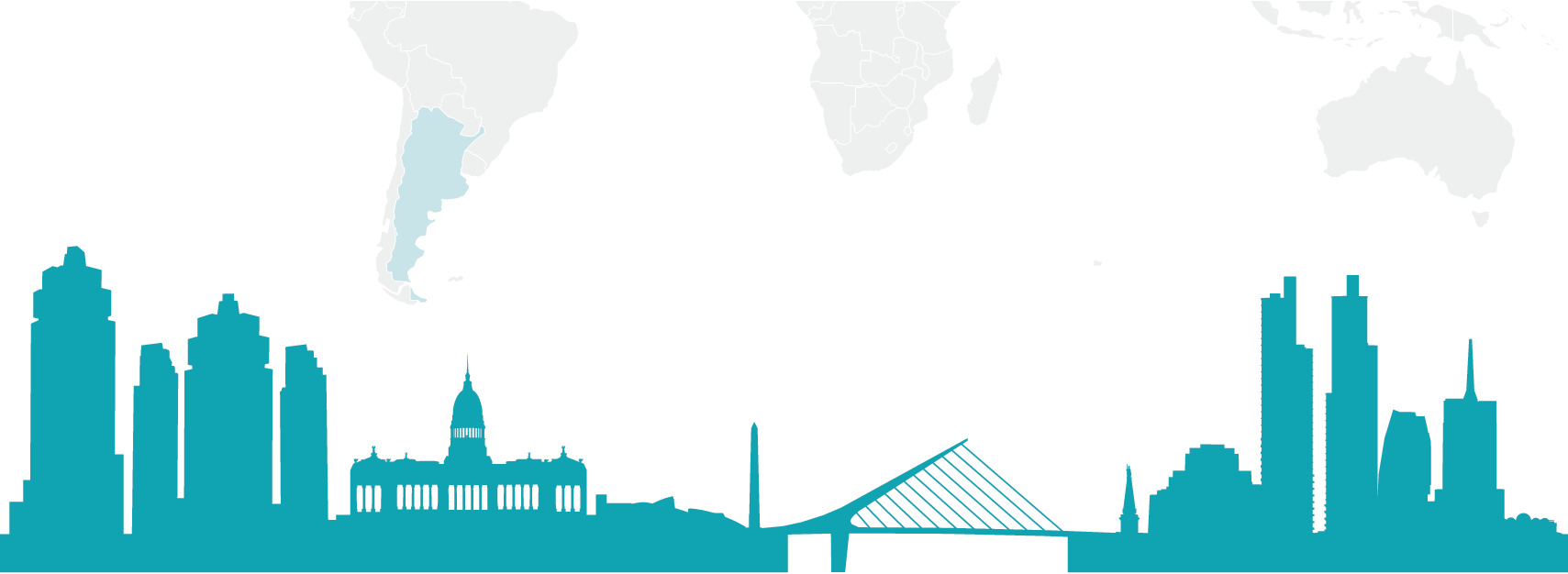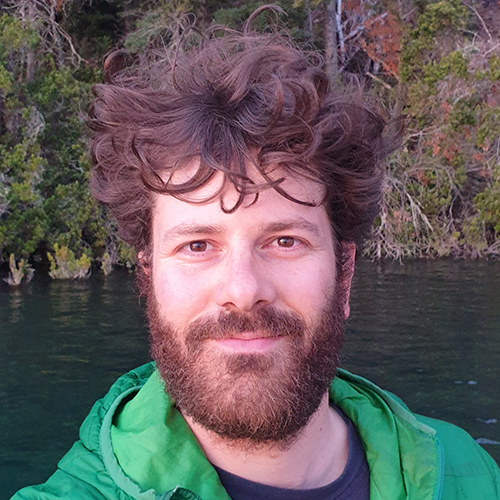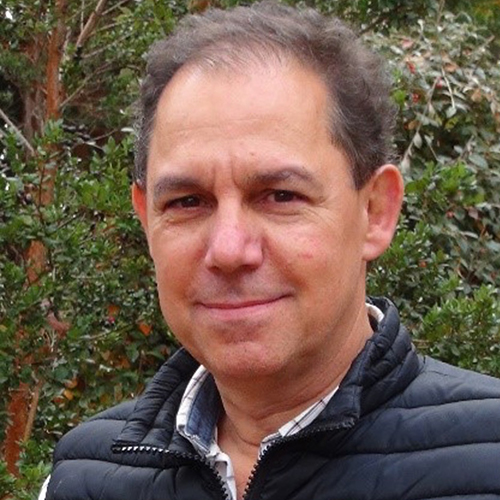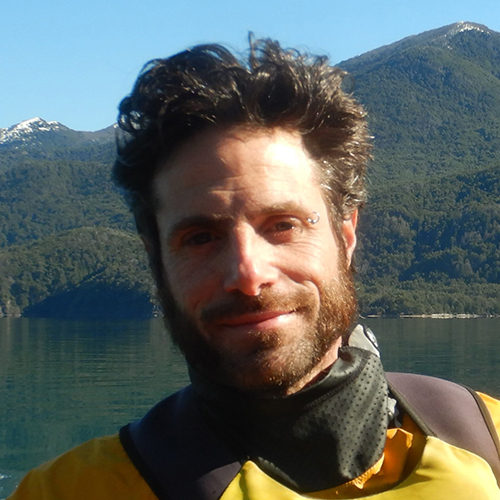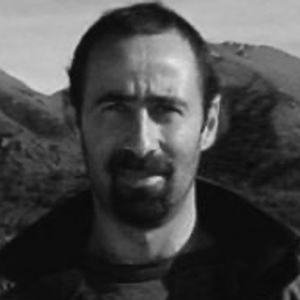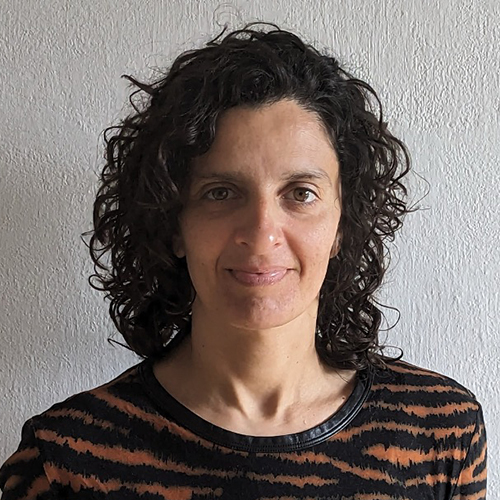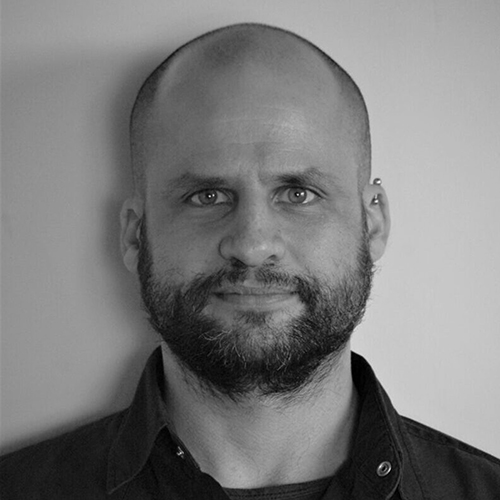News and events
- Meeting
- December, 11 2025
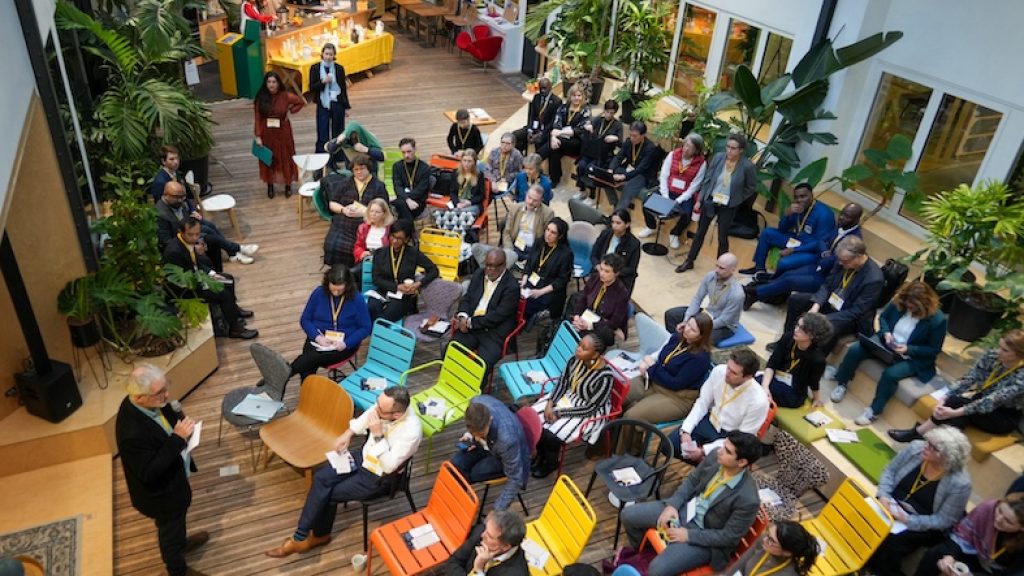
Participation in the REN21 Steering Committee Meeting
- –
- Meeting
- January 9, 2026
Participation in the REN21 Steering Committee Meeting
- Argentina
In December, Ignacio Sagardoy from Fundación Bariloche joined colleagues from around the world to take part in the Steering Committee meeting of REN21, one of the leading global organizations dedicated to promoting renewable energy as a key pathway to decarbonizing economies.
The meeting proved to be highly productive, offering a valuable forum to reflect on the challenges ahead while also providing insights into concrete initiatives that are actively driving the global deployment of renewable energy.
At Fundación Bariloche, collaboration with organizations such as REN21 reflects a broader institutional commitment to advancing a just energy transition—one that not only reduces greenhouse gas emissions, but also expands access to energy services and supports sustainable development worldwide.
- Workshop
- November 11-13, 2025

Presentation of Distributed Energy Futures for Argentina: A Coupled Energy-Economy Scenario Analysis to 2050
- –
- Workshop
- January 8, 2026
Presentation of Distributed Energy Futures for Argentina: A Coupled Energy-Economy Scenario Analysis to 2050
- Argentina
The PhD Student of Fundación Bariloche, Aliosha Behnisch, participated in the 18th Annual Meeting of the Integrated Assessment Modelling Consortium (IAMC) held in Búzios, Brazil, from November 11th to 13th, presenting “Distributed Energy Futures for Argentina: A Coupled Energy-Economy Scenario Analysis to 2050”. The presentation, based partly on modeling work developed during the DDP IMAGINE project, highlighted the challenges and opportunities of transitioning Argentina’s energy system towards sustainability, emphasizing the potential for DER technologies in the country’s transition and development strategies. Coupling energy and economy models, the research explored pathways to balance energy demands, economic development, and environmental goals, providing insights into policy options for achieving a just and sustainable transition in Argentina. This contribution underscores Fundación Bariloche’s commitment to advancing knowledge and dialogue on sustainable energy solutions in developing countries.
- Workshop
- November 26-31, 2024
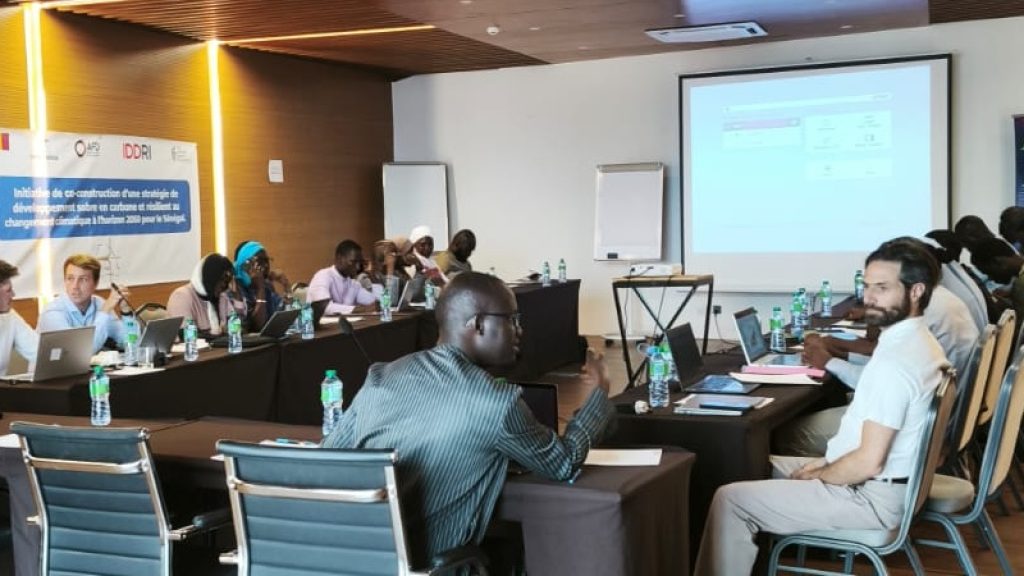
Workshop on Long-Term Energy Planning and use of LEAP software to build Greenhouse Gas (GHG) emission scenarios for Senegal
- –
- Workshop
- December 16, 2024
Workshop on Long-Term Energy Planning and use of LEAP software to build Greenhouse Gas (GHG) emission scenarios for Senegal
- Africa, Argentina, Senegal
From November 26 to 31 2024, an intensive energy planning workshop was held in Senegal, led by Francisco Lallana and Ignacio Sagardoy, from Fundación Bariloche. Members of ENDA Energie Organization, Senegalese Energy Transition Core Group, as well as other stakeholders from government agencies, were trained in the process of building and validating a national energy model with LEAP, building on the progress made last year with the support of IDDRI.
Several scenarios that simulate energy consumption, economic growth and GHG emissions trajectories were explored. The ultimate goal of the collaboration between the institutions is to identify the best options for achieving low-carbon development improving the quality of life of the people of Senegal, while taking the challenges posed by Climate Change into consideration.
- Conference
- November, 4-6, 2024
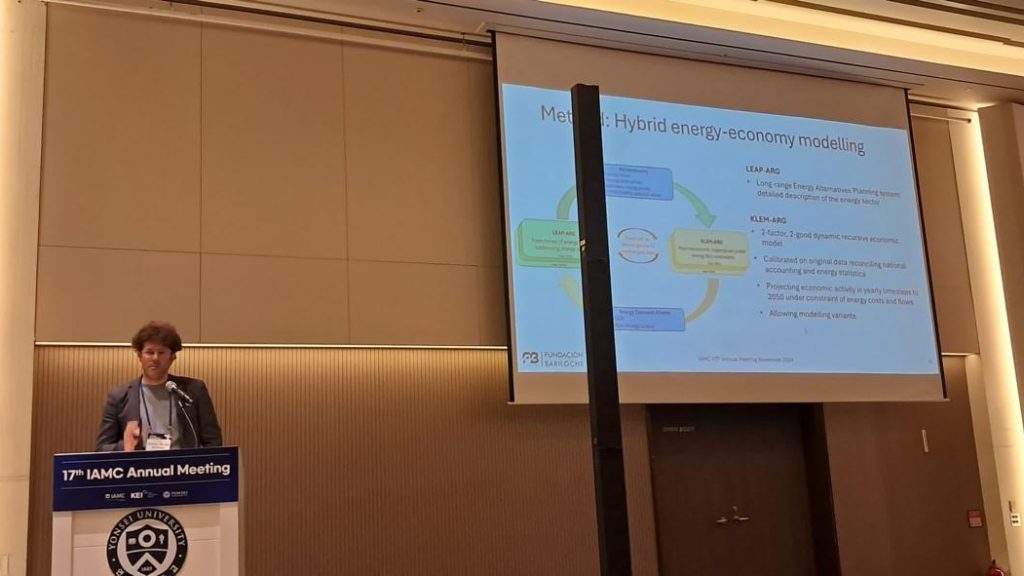
Presentation of “Towards a sustainable energy transition in Argentina: exploring futures for hydrocarbons and green commodities”
- Imagine
- Conference
- December 16, 2024
Presentation of “Towards a sustainable energy transition in Argentina: exploring futures for hydrocarbons and green commodities”
- Argentina
The PhD Student of Fundación Bariloche, Aliosha Behnisch, participated in the 17th Annual Meeting of the Integrated Assessment Modelling Consortium (IAMC) held in Seoul, South Korea, from November 4th to 6th, presenting “Towards a Sustainable Energy Transition in Argentina: Exploring Futures for Hydrocarbons and Green Commodities”. The presentation, based on work developed during the DDP IMAGINE project, highlighted the challenges and opportunities of transitioning Argentina’s energy system towards sustainability, emphasizing the role of hydrocarbons and the potential for green commodities in the country’s transition and development strategies. Coupling energy and economy models, the research explored pathways to balance energy demands, economic development, and environmental goals, providing insights into policy options for achieving a just and sustainable transition in Argentina. This contribution underscores Fundación Bariloche’s commitment to advancing knowledge and dialogue on sustainable energy solutions in developing countries.
- High-level conference
- June, 10-11 2024
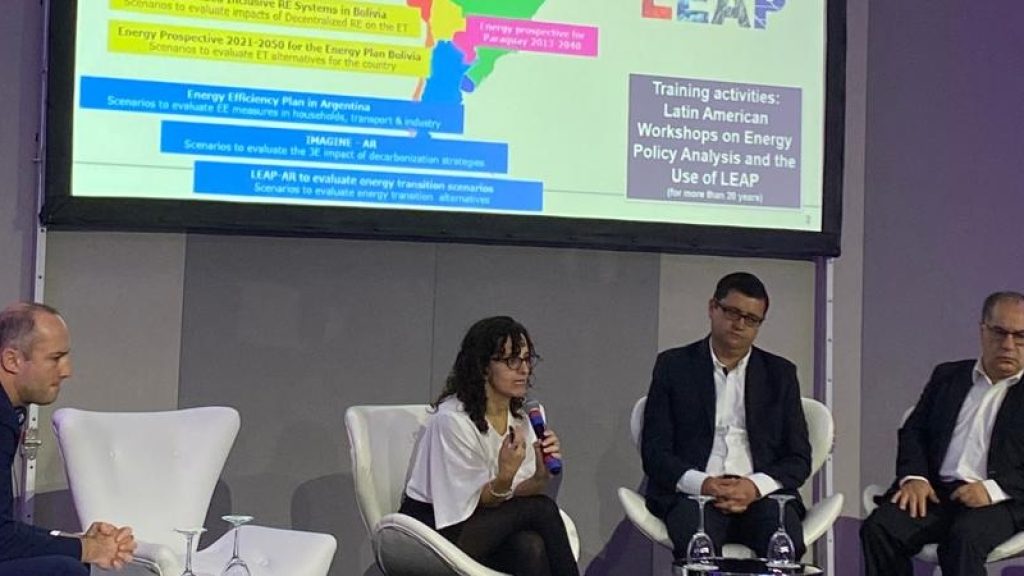
Participation in the conference: “Navigating the climate Just Transition in a low growth macroeconomic context: the critical role of Ministries of Finance”
- –
- High-level conference
- August 16, 2024
Participation in the conference: “Navigating the climate Just Transition in a low growth macroeconomic context: the critical role of Ministries of Finance”
- Argentina
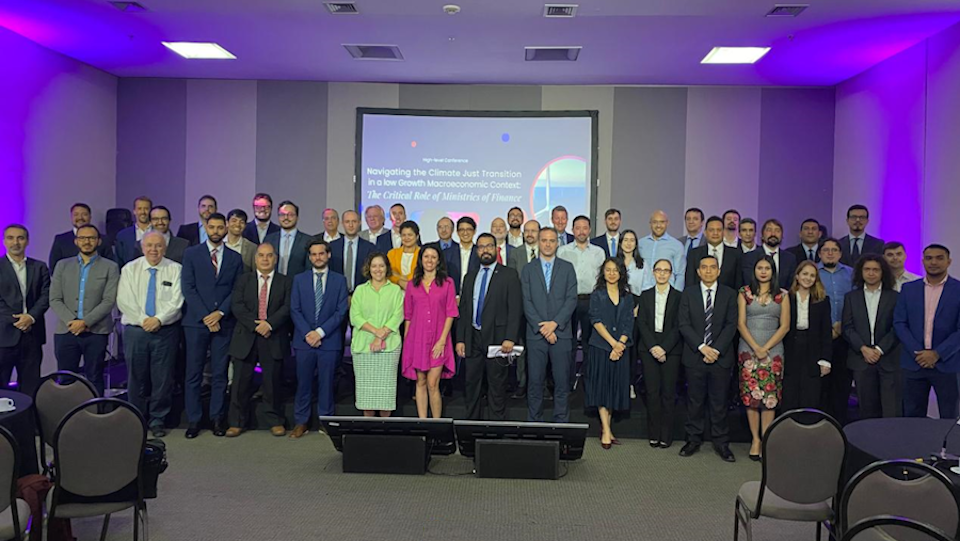
The Bariloche Foundation was invited by ECLAC and the World Bank, to participate in event in the session “How can scenario analysis help decision makers in a context of transition?”. During this session Dr. Marina Recalde, shared the experience of the institution in the development of energy scenarios in the region, emphasizing the role of these quantification exercises to show the multiple impacts that decarbonization trajectories have on energy, emissions and the economy, constituting a powerful tool for dialogue between different governmental areas, and a fundamental input for the design of energy and climate policy.
Read more on the Bariloche Foundation website
Read more on the CEPAL website
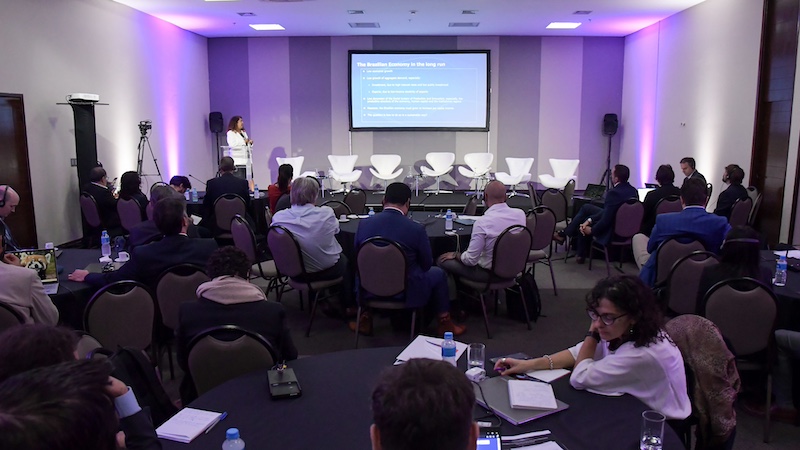
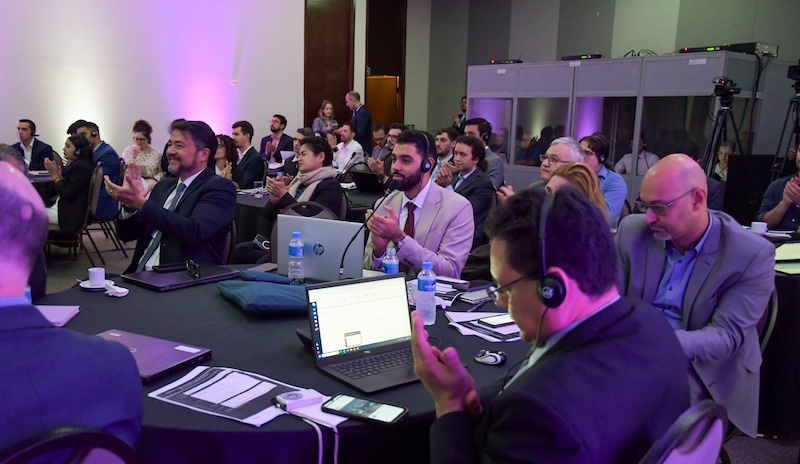
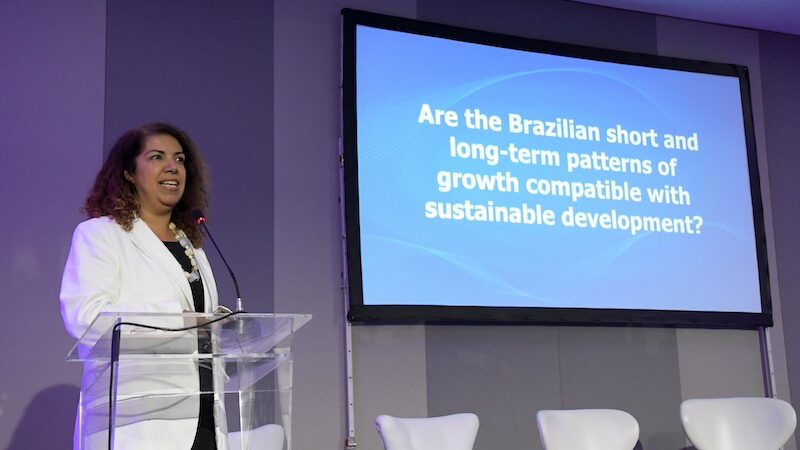
- Workshop
- March 3rd, 2024
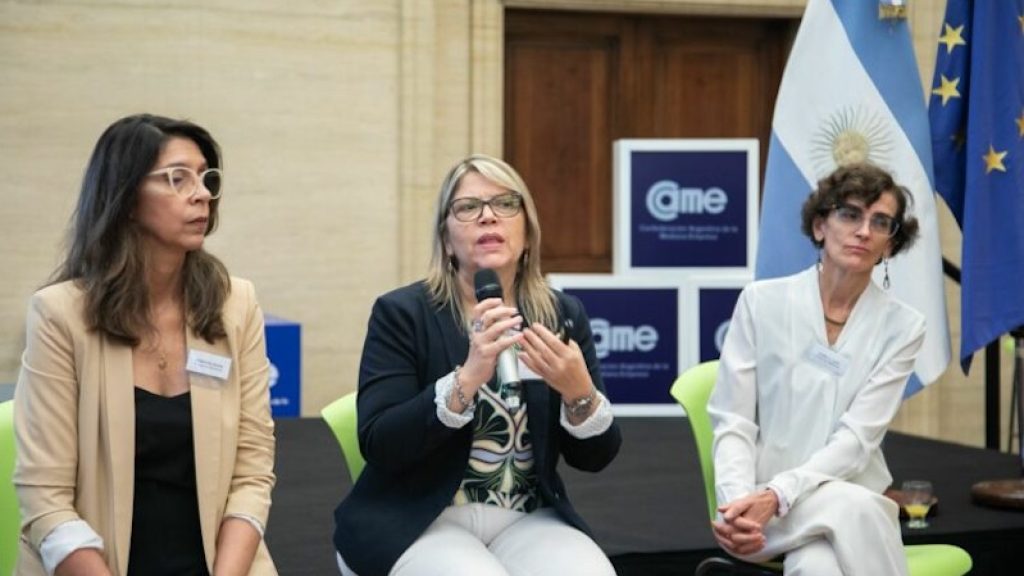
3rd Workshop for the Promotion of Cogeneration in Argentina
- –
- Workshop
- May 31, 2024
3rd Workshop for the Promotion of Cogeneration in Argentina
- Argentina
With the participation of approximately 50 professionals from all over the country, Fundación Bariloche developed the third and last workshop for the promotion of cogeneration in Argentina which was held in the Auditorium of the Argentine Confederation of Medium Enterprises (CAME).
This workshop was the final stage of a project financed by the European Union (as part of its climate dialogues project) for the National Energy Secretariat, with the objective of building a “Roadmap” to promote the development of cogeneration in Argentina, which is considered a key energy efficiency measure to achieve the Country’s Commitments of the Paris Agreement.
In-country work since
In country work, since 1963, DDP work with IDRC, since 2018
Key areas of work
- Net Zero & long-term planning
- Clean power and energy systems
- Land-use and food transformations
- National systemic transformations
- Just Transitions & socio-economic implications of the transitions
- Development & climate interface
- Natural Gas transitions
- Industrial decarbonization Energy Policy
Key in-country partners
Researcher at Fundación Bariloche & Doctoral fellow CONICET in Strategic Issues
Economist and Expert in energy planning, development of socioeconomic scenarios, cost studies, final energy demand, decarbonization alternatives and climate change mitigation strategies
Senior Researcher and lecturer in resource and technology assessment, identification of barriers and opportunities for renewable energy penetration, formulation of recommendations and guidelines for energy and environmental policies
Researcher at Fundación Bariloche & Independent Researcher of the National Council of Science and Technology (CONICET)
Details
Latest DDP Scenario
IMAGINE (currently being developed):
Notes: these Scenarios are designed to evaluate the energy-environmental-economic impacts of a Natural Gas Strategy (for which Argentina has huge reserves) and more ambitious DDP strategies based on a differential cooperation world.
- Sce I BAU/CPS. At the national level, this Scenario includes ongoing actions in the energy sector, a Current Policies Scenario. It proposes the historical trajectory of natural gas (NG) production and projected exports, mainly through regional pipelines and one already projected liquefaction plant for LNG exports.
- Sce II: Natural Gas Exports. This is a Scenario in which Natural Gas, especially Non-Conventional Natural Gas plays a key role in the medium term. There is an increase in the exploitation of non-conventional Natural Gas fields, mainly for export purposes, and its rents are used to finance the Energy Transition in the medium / long term. Natural Gas domestic consumption decreases to the end of the period. The decarbonization ambition of this Scenario is a bit higher than the BAU Scenario, particularly in the power sector, but this is not yet a Paris compatible Scenario.
- Sce III: Natural Gas reduction without international cooperation. This Scenario is built in a context of reduced international cooperation and technology transfer and also with high environmental commitments.
The decarbonization ambition of this Scenario is higher, in terms of the speed of fossil fuels phase out (specially NG) in power generation and final consumption sectors. The natural gas exports reduce in the short term (opposite to Scenario 2), and so do the rents to finance the energy transition. No additional international support is simulated. - Sce IV: Energy Green Exports Scenario. This Scenario is an ambitious decarbonization scenario built in an international cooperation context. We evaluate the production and export of green products, mainly Green Ammonia. International cooperation is simulated by a reduction in the discount rate used for the evaluation of the energy investments. Regarding decarbonization measures, this scenario includes fuel substitution in end-use sectors and power sector (specially wind and solar). For instance: a reduction in the consumption of petroleum derivatives and natural gas consumption, a strong increase in electrification and in the use of biomass, increase in the use of biomass and waste in industry, strong energy efficiency actions, electricity penetration in transport policies.
Contributions to policy processes
DDP Argentina and related projects have contributed to:
The work provides the country’s governments and research institutes and other relevant stakeholders with tools to:
- Design and strengthen long-term strategies in line with national development goals.
- Align short- and medium-term sectoral, economic and national development plans with long-term strategies, including the need for a just transition. Particularly for the Energy Sector and the links with the Productive System, and respective trends.
- Identify opportunities to improve nationally determined contributions based on the long-term strategy.
Contribute to the Global Stocktake 2023 by synthesizing available knowledge and producing new assessments that help identify opportunities to accelerate national and global climate action in ways that can inform the GS process and build on its findings to support increased collective ambition to achieve the Paris agreement. DDP work feeds an ongoing national interactive and participatory process, coordinated by the NCC Cabinet, SAyDS of Argentina. The purpose of this Extended Roundtables is to inform civil society on the progress of the National Climate Change Adaptation and Mitigation Plan (PNAyMCC) and the Long Term Low Emissions Resilient Development Strategy (ELP), sharing progress in terms of the inputs that make up the national climate policy to be presented at the COPs and to receive suggestions, input and information.
Key projects
- IMAGINE
- DDP LAC
- 2050 is now: Aligning Climate Action with Long-term Climate and Development Goals
Key in-country collaborations
- N/A
Past and ongoing projects
- Report (September 2021): Analysis of current ambition level in Argentina
- Report (2020):
- Repor (2014) CLIMACAP, Climate and Energy Policy reviews for Colombia, Brazil, Argentina, and Mexico
- Paper(2016) Emissions reduction scenarios in the Argentinean Energy Sector
- Paper (2017) Escenarios sobre el impacto del cambio climático en la generación eléctrica del Comahue y sus consecuencias en el sistema energético argentin
- Report (2019) Mapeo situacional de la planificación energética regional y desafíos en la integración de energías renovables: hacia una planificación sostenible para la integración energética regional
- Paper(2021) Net-zero deep decarbonization pathways in Latin America: Challenges and opportunities
- Paper(2021) The multi-level economic impacts of deep decarbonization strategies for the energy system
- Paper(2021) A low GHG development pathway design framework for agriculture, forestry and land use
- Paper(2021) Exploring deep decarbonization pathways for Argentina
- Workshop (2021) Medida de eficiencia energética y barreras para su implementación en las grandes empresas del sector industrial argentino
- Workshop (2021) Medida de eficiencia energética y barreras para su implementación en las PyMEs del sector industrial argentino
- Report (2021) Propuesta de Plan Nacional de Eficiencia Energética Argentina.
- Paper (2022) Aportes de los planes de eficiencia para la transición energética y metodología para su desarrollo: el caso del sector residencial de argentina
- Event (2023) 2nd Workshop on Policy Instruments to promote Cogeneration in Argentina
- Report (2021) Monjeau, A., Frank, F., Antuña, J.C., Nadal. G., Parma, M.E., García-Martínez, P. Boer, M., Zuliani, M., Elías, M., Sirimarco, X., Barral, M.P., Villarino, S., Bouille, D., Di Sbroiavacca, N., Amata, E., Cáceres Pullol, A., Ruiz-Barlett, T., Laterra, P.(2021) Modeling AFOLU Sector’s climate change adaptation measures for the long-term strategy of reducing greenhouse gasses emissions in Argentina. Final Report prepared for the European Climate Fund.
- Events (2020/21) bi-weekly Virtual Technical Dialogues. Through the initiative of the Regional Forum of Energy Planners (FOREPLEN) of ECLAC, with the support of the GET.transform Programme of the European Union, in collaboration with IRENA, seeks to implement the series of technical webinars, focused on the development and use of long-term energy scenarios to guide the energy transformation. This initiative hopes to offer and provide a platform for knowledge exchange, collect and share best practices and experiences among energy planners in the Latin American and Caribbean region. Long-term scenarios for the development of national clean energy transition plans. Eight bi-national WORKSHOPS were developed. Reports (2015 to 2021) Climate Technology Transfer Mechanisms and Networks in Latin America and the Caribbean. Research aimed at fulfilling the objectives of training and transfer of environmentally sound technologies, required by public entities (beneficiaries) of regional, national, or local order oriented to the definition and implementation of public policies on energy efficiency and renewable energy. Promotion, development and transfer of environmentally sound technologies (EST) in Latin America and the Caribbean, in order to contribute to the reduction of greenhouse gas emissions and vulnerability to the effects of climate change in specific sectors of the region. The project’s strategy is to build national capacities to identify, assess and develop such technologies. 22 main studies and 10 secondary studies were carried out. case studies
